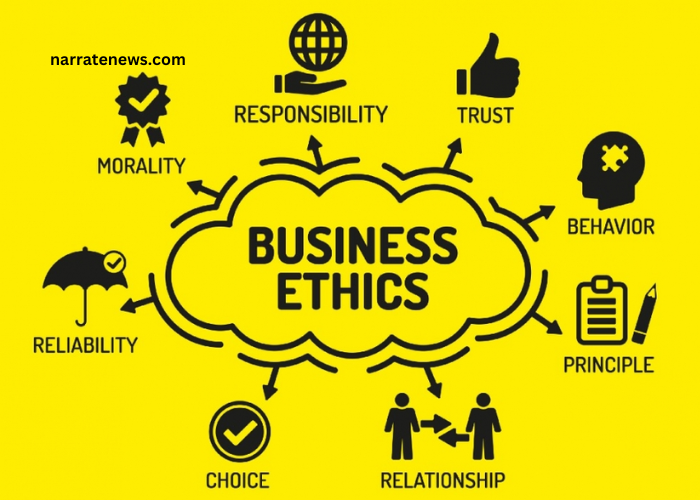
Ethical Business Practices: Nurturing a Culture of Integrity
In the fast-paced and interconnected world of business, the importance of ethical practices cannot be overstated. Ethical business conduct goes beyond mere legal compliance; it involves fostering a culture of integrity, trust, and social responsibility. In this comprehensive exploration, we will delve into the essence of ethical business practices, their impact on organizational success, and strategies for cultivating a business environment built on principles that extend beyond profit margins.
Section 2: Defining Ethical Business Practices
1.1 The Essence of Ethics in Business:
Ethical business practices encompass a set of moral principles and values that guide the decision-making and conduct of individuals within an organization. These principles go beyond legal requirements and dictate how a company interacts with its stakeholders, including employees, customers, suppliers, and the community at large. At the heart of ethical business practices lies the commitment to doing what is right, just, and fair, even in the face of challenging decisions.
1.2 Key Elements of Ethical Business Practices:
Understanding ethical business practices involves considering various key elements:
1.2.1 Honesty and Transparency:
An ethical business is transparent in its operations and communicates openly with all stakeholders. Honesty fosters trust, a crucial element in building and maintaining strong relationships with customers, employees, and partners.
1.2.2 Fair Treatment of Employees:
Ethical businesses recognize the value of their employees and treat them with fairness and respect. This involves offering fair wages, providing equal opportunities for professional growth, and maintaining a safe and supportive work environment.
1.2.3 Customer-Centric Approach:
Prioritizing customer satisfaction is a hallmark of ethical business practices. This involves delivering quality products or services, providing accurate information, and addressing customer concerns promptly and honestly.
1.2.4 Social and Environmental Responsibility:
Ethical businesses consider the impact of their operations on society and the environment. Social responsibility initiatives may include community engagement, charitable activities, and sustainable business practices that minimize environmental impact.
1.2.5 Compliance with Laws and Regulations:
While ethical behavior goes beyond legal requirements, compliance with laws and regulations is a fundamental aspect of ethical business practices. Adhering to legal standards ensures that the organization operates within the bounds of the law.
Section 2: The Impact of Ethical Business Practices
2.1 Building Trust and Reputation:
Trust is a valuable currency in business, and ethical practices are the foundation upon which trust is built. Companies that consistently act with integrity and transparency foster trust among customers, employees, and the broader community. A solid reputation for ethical behavior enhances a company’s brand image and contributes to customer loyalty.
2.2 Employee Morale and Productivity:
Ethical treatment of employees creates a positive workplace culture. Fair wages, equal opportunities, and a supportive environment contribute to high employee morale and increased productivity. Engaged and satisfied employees are more likely to stay with the company and contribute positively to its success.
2.3 Customer Loyalty and Retention:
Ethical business practices are instrumental in building long-term relationships with customers. When customers trust a company to act ethically, they are more likely to remain loyal. Repeat business, positive word-of-mouth, and customer advocacy become natural outcomes of ethical conduct.
2.4 Risk Mitigation:
Ethical behavior can mitigate legal and reputational risks. Unethical conduct can lead to legal consequences, damage the company’s reputation, and result in financial losses. Ethical business practices serve as a proactive measure to safeguard against potential risks.
2.5 Competitive Advantage:
In a crowded marketplace, ethical behavior can be a significant differentiator. Companies known for their commitment to ethics gain a competitive edge, attracting customers who prioritize ethical considerations in their purchasing decisions. Ethical practices contribute to brand loyalty and preference.
2.6 Attracting and Retaining Talent:
Employees increasingly seek employers with a strong ethical stance. Companies that prioritize ethical business practices are more likely to attract and retain top talent. Ethical behavior is often a key factor in the decision-making process for job seekers.
2.7 Enhanced Innovation and Creativity:
An ethical business culture encourages open communication and collaboration. Employees in an ethical environment feel empowered to share ideas without fear of retaliation. This openness fosters innovation and creativity, driving the company’s competitiveness and adaptability.
2.8 Long-Term Sustainability:
Companies committed to ethical business practices are better positioned for long-term sustainability. Ethical considerations, such as social and environmental responsibility, align with changing consumer preferences and evolving global standards. A focus on sustainability contributes to the company’s resilience in the face of challenges.
Section 3: Strategies for Cultivating Ethical Business Practices
3.1 Leadership Commitment:
Ethical business practices must start at the top. Leadership commitment to ethical behavior sets the tone for the entire organization. Leaders should embody the values they expect employees to follow and prioritize ethical decision-making in all aspects of the business.
3.2 Clearly Defined Code of Ethics:
Establishing a clear and comprehensive code of ethics is crucial for guiding employee behavior. The code should outline the company’s values, expectations, and standards for ethical conduct. Regular training and communication reinforce the importance of adhering to the code.
3.3 Ethical Decision-Making Processes:
Providing employees with tools and frameworks for ethical decision-making is essential. Ethical dilemmas may arise in various business situations, and employees need guidance on how to navigate these challenges while upholding the company’s values.
3.4 Employee Training and Education:
Ongoing training and education programs ensure that employees are aware of ethical standards and understand their role in upholding them. Training can cover various aspects of ethical behavior, including compliance, conflict resolution, and recognizing ethical dilemmas.
3.5 Whistleblower Protection:
Encouraging a culture where employees feel comfortable reporting unethical behavior is vital. Establishing whistleblower protection mechanisms ensures that individuals who speak up about ethical concerns are protected from retaliation.
3.6 Performance Evaluation:
Integrating ethical considerations into performance evaluations reinforces the importance of ethical behavior. Recognizing and rewarding employees who consistently uphold ethical standards reinforces the company’s commitment to its values.
3.7 Supplier and Partner Evaluation:
Extending ethical considerations to suppliers and business partners is crucial. Evaluating the ethical practices of suppliers and partners ensures alignment with the company’s values and prevents associations with entities that may compromise ethical standards.
3.8 Continuous Improvement:
Ethical business practices are not static; they should evolve with changing circumstances and societal expectations. Establishing mechanisms for continuous improvement allows the company to adapt its ethical practices to new challenges and opportunities.
Section 4: Ethical Business Practices in Different Industries
4.1 Technology and Data Privacy:
In the technology industry, ethical considerations revolve around data privacy, security, and responsible use of emerging technologies. Companies must prioritize protecting user data, ensuring transparency in data practices, and addressing the ethical implications of artificial intelligence and machine learning.
4.2 Finance and Banking:
Ethical business practices in finance involve transparency in financial transactions, responsible lending practices, and adherence to regulatory standards. Prioritizing customer interests, avoiding conflicts of interest, and preventing fraudulent activities are key considerations.
4.3 Healthcare:
In the healthcare industry, ethical practices include providing quality patient care, respecting patient confidentiality, and ensuring fair and transparent pricing. Ethical considerations also extend to research practices, drug development, and access to healthcare services.
4.4 Food and Agriculture:
Ethical considerations in the food and agriculture industry involve sustainable and responsible farming practices, fair treatment of workers, and transparent labeling. Companies must prioritize food safety, environmental sustainability, and ethical sourcing of ingredients.
4.5 Fashion and Apparel:
In the fashion industry, ethical business practices encompass fair labor practices, sustainable manufacturing processes, and responsible sourcing of materials. Addressing issues such as worker exploitation, environmental impact, and waste reduction are crucial for ethical fashion brands.
4.6 Energy and Environment:
Companies in the energy and environmental sector must prioritize sustainable practices, reduce carbon footprints, and invest in renewable energy sources. Ethical considerations involve minimizing environmental impact, transparent reporting, and community engagement.
Section 5: Overcoming Challenges in Implementing Ethical Business Practices
5.1 Short-Term Profit Pressures:
One of the challenges in implementing ethical business practices is the pressure for short-term profits. Companies may face temptations to compromise on ethical standards to meet immediate financial goals. However, the long-term benefits of ethical conduct often outweigh short-term gains.
5.2 Lack of Awareness:
Some employees may not be fully aware of the ethical standards and expectations set by the company. This lack of awareness can lead to unintentional violations of ethical practices. Comprehensive training and communication programs help address this challenge.
5.3 Global Operations and Cultural Differences:
Companies with global operations face the challenge of navigating cultural differences and diverse regulatory environments. What is considered ethical in one culture may differ in another. Establishing a universal code of ethics while respecting cultural nuances is crucial.
5.4 Resistance to Change:
Implementing ethical business practices may face resistance from individuals or departments accustomed to less ethical conduct. Overcoming this resistance requires effective communication, leadership commitment, and demonstrating the benefits of ethical behavior.
5.5 Balancing Stakeholder Interests:
Balancing the interests of different stakeholders, including customers, employees, investors, and the community, can be challenging. Ethical decision-making involves considering the impact on all stakeholders and finding a balance that aligns with the company’s values.
Section 6: Case Studies in Ethical Business Practices
6.1 Patagonia: A Commitment to Sustainability
Patagonia, an outdoor clothing company, is known for its unwavering commitment to sustainability and ethical business practices. The company prioritizes environmental responsibility, fair labor practices, and transparency in its supply chain. Patagonia’s transparency about its manufacturing processes and dedication to minimizing its environmental impact have contributed to its strong reputation and customer loyalty.
6.2 Google: Prioritizing Diversity and Inclusion
Google has placed a strong emphasis on ethical practices, particularly in the areas of diversity and inclusion. The company has implemented initiatives to increase workforce diversity, address gender pay gaps, and create an inclusive work environment. By prioritizing ethical considerations in its human resources practices, Google aims to foster a culture of fairness and equality.
6.3 Johnson & Johnson: Ethical Crisis Management
In the 1980s, Johnson & Johnson faced a major ethical crisis with the Tylenol poisonings. Instead of prioritizing profits, the company took immediate and transparent action, recalling 31 million bottles of Tylenol and redesigning packaging to prevent tampering. Johnson & Johnson’s swift and ethical response to the crisis is often cited as a model for crisis management and ethical conduct.
Section 7: Conclusion
In a world where business decisions have far-reaching consequences, ethical business practices are not just a moral imperative but a strategic necessity. Organizations that prioritize integrity, transparency, and social responsibility create a foundation for enduring success. Ethical behavior builds trust with employees, customers, and stakeholders, contributing to a positive brand reputation and long-term sustainability. As businesses navigate complex challenges and global uncertainties, embracing ethical practices remains a guiding principle for creating a positive impact on society, the environment, and the bottom line. Cultivating a culture of ethical business practices is an investment in the future, ensuring that businesses not only thrive in the present but also contribute to a more just and sustainable world.


